Your Ultimate Guide to Building the Best Home Security System
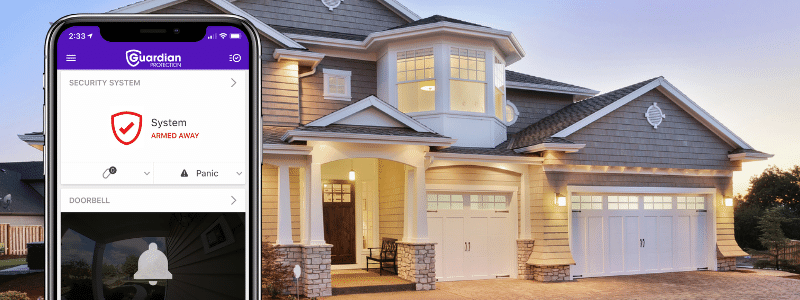
Looking to make your home safer with smart home security? That’s a really smart choice, but making the decision is just the first step.
Creating a security solution that’s just right for you requires a little research and planning. Luckily, we’ve created this guide to cover everything you need to create a smart home system that keeps you and your family safe, and makes life easier.
Contents
Why do I need a home security system?
What are the benefits of multi-layer home security?
Different types of home security equipment
24/7 professional alarm monitoring
Professional security equipment installation
Monitored carbon monoxide detectors
Why do I need a home security system?
The primary benefit of owning a home security system is for intrusion detection. Intrusion detection helps protect your home and family from property crimes like burglaries and home invasions.
Burglary is the unlawful entering of someone’s property without permission, with the intent to commit a crime, and it accounts for 16 percent of all U.S. property crimes in the United States.
A professionally monitored burglar alarm system is the smartest choice to help protect your home. A study of known offenders revealed that more than half would change their minds about entering a home if they saw an alarm system in place.
What are the benefits of multi-layer home security?
While intrusion detection is often the first thing to come mind when considering home security, there is so much more you can do to protect and stay connected to your home. That’s where multi-layered security comes in.
Intrusion detection should include integrated, multi-layered deterrents that put up as many barriers as possible between your home and would-be intruders.
Security experts compare layered home security to putting on multiple layers of clothing on a really cold day. The more security barriers you stack up between your home and intruders, the less likely it is your house will be viewed as an easy target.
Different types of home security equipment
Most security equipment falls into one of the following buckets:
- Intrusion detection
- Life safety
- Environmental monitoring
- Video security
- Smart home automation
No matter what kind of security equipment you choose, it’s important to know a little about the quality of the equipment and where it comes from.
Shopping for home security? Our essential guide can help!
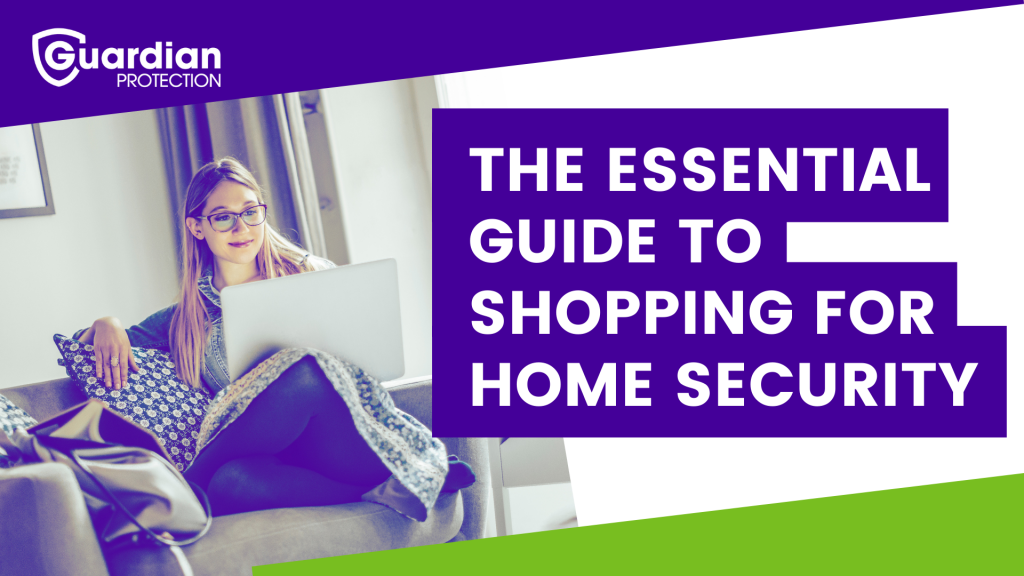
Grab our essential guide for choosing a home security system!
Download PDFThe smart home security essentials you need
So what are the different security layers that make up a smarter, safer home? So glad you asked, because this is where we can really help.
Intrusion detection equipment
Intrusion detection is the core equipment most people associate with security, used to help prevent break-ins and protect your home. You may see it referred to as a burglary system, or a burglar alarm.
The most important components of intrusion detection include:
Security panel
The brain of your security system that controls everything. This is where you enter your code to arm and disarm the system.
Door and window sensors
Lets you know when a door or window is opened. Place them on anything in your home you want to monitor, like gun safes and liquor cabinets. Sometimes referred to as door and window contacts.
Motion sensors
Used to detect movement across the spaces they cover in the interior of the home. When triggered, a signal is sent to your control panel and the monitoring center.
Glass break sensors
Recognizes the sound of breaking glass and alerts your system. This is critical if intruders try smashing a window instead of prying it open.
Smart security control panels
The main connection point between the homeowner and central station is a control panel. This is the touchscreen or keypad where you enter your code to arm and disarm the system. As an example, here’s the Guardian IQ2 touchscreen control panel.
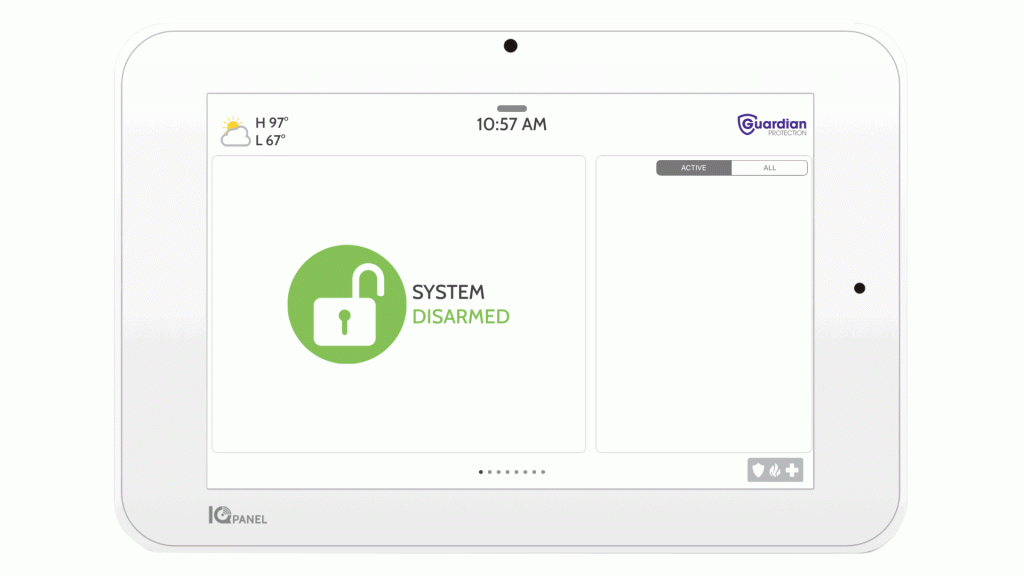
Most modern panels are touchscreens, and some include features like cameras and glassbreak detection. Sometimes referred to as a hub, keypad, or control panel.
Learn more about the Guardian IQ2 security panel.
Motion detection
Motion detection is one of the bedrocks of security. If someone is in your home who shouldn’t be, motion sensors should catch it. They are used to detect movement across the spaces they cover in the interior of the home.
Motion sensors are typically only armed when you’re not home, or at night while everyone is still and snoring. When the sensor is triggered, a signal is sent to your control panel and to the monitoring center.
The cousins of motion sensors are door and window security contacts, also referred to as door and window sensors. These are installed on exterior entry points, or virtually any door or window that can be opened or closed. Unlike motion detectors, these often remain armed both when you’re home and when you’re away.

Smart security sensors for your home
Smart sensors offer yet another application. These discreet sensors can be placed on restricted areas in your home, like a medicine or gun cabinet.
A few cool things motion detection equipment can do:
- Send you a mobile alert when movement is detected
- Tip you off if a certain teenager is getting into your liquor cabinet
- Remind you that a door or window was left open
- Sensitivity can be adjusted to ignore pets up to a certain weight
24/7 Professional alarm monitoring
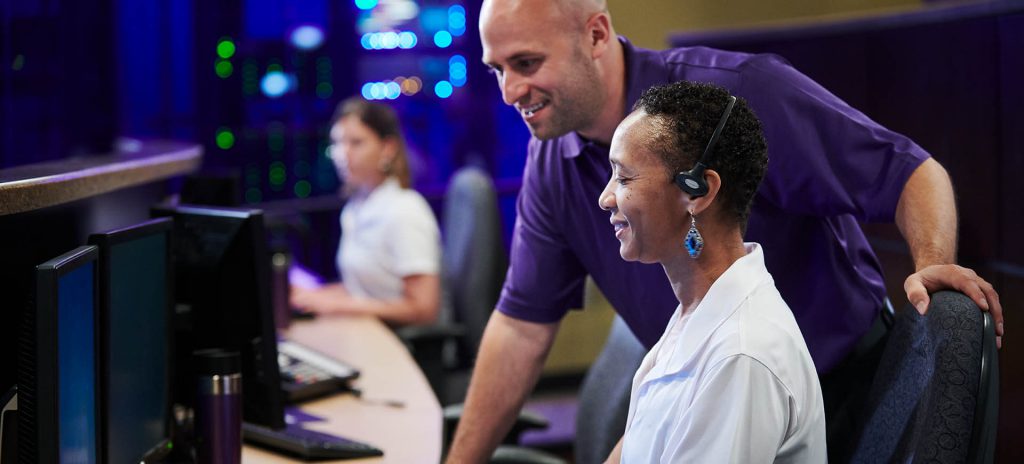
You can’t have true security without professional monitoring. But before we can talk about the benefits of alarm monitoring, allow us to cover the basics (without getting too techy).
How professional security monitoring works
Monitored security systems communicate with a central monitoring station. Lots of info travels back and forth between the homeowner and the monitoring center, like emergency alarms, notifications, and event logs. This critical info is communicated through the security system panel we mentioned earlier.
Central stations are staffed around the clock by a team of experts dedicated to monitoring your system. They keep an eye on your alarm signals, call you when there’s a problem, and contact emergency responders if you need them.
What are the benefits of alarm monitoring?
Video surveillance and motion detection are awesome — we’re going to talk about just how awesome they are later — but equipment will only get you part of the way there. Inevitably, sooner or later, you’re not paying attention when you need to be.
True home security is a full-time job — or more accurately, a 24/7/365 commitment. You can’t be everywhere at once. You can’t monitor your home (or business, or anything for that matter) all the time.
When you have professionally monitored home security, you don’t have to worry about alerting authorities in an emergency. Whether you’re home or in another country, if your alarm goes off, that monitoring center will know about it and quickly take action for you.
Professional security equipment installation
When it comes to installing a security system, the details matter. For example, did you know that improper placement of motion detectors can lead to costly false alarms? Probably not, and if you don’t eat, sleep, and breathe security like we do here at Guardian, there’s no reason you should.
Professional installation is something that gets swept under the rug a lot in the security market. We’ve said it before and it’s still true — sure, you can DIY. But do you really want to?
Anything worth doing is worth doing right. You probably wouldn’t install your own central air conditioning or give yourself stitches; you’d leave it to the pros, and the same standard should be set for your safety. From choosing the proper equipment and its placement to ensuring it’s installed correctly, complete and effective security requires a lot of consideration.
Am I placing something too close to the utility room? Is my WiFi strong enough to support the devices I’ve chosen? Are my cameras and motion detectors covering all the areas that are important to me? These are the things a good professional installer will consider and talk through with you before making decisions.
With something as important as protecting your home and loved ones, why risk mistakes? Instead, consider the option of having a system professionally installed by a low voltage expert with extensive training. You’ll feel good knowing it’s done right.
Video surveillance
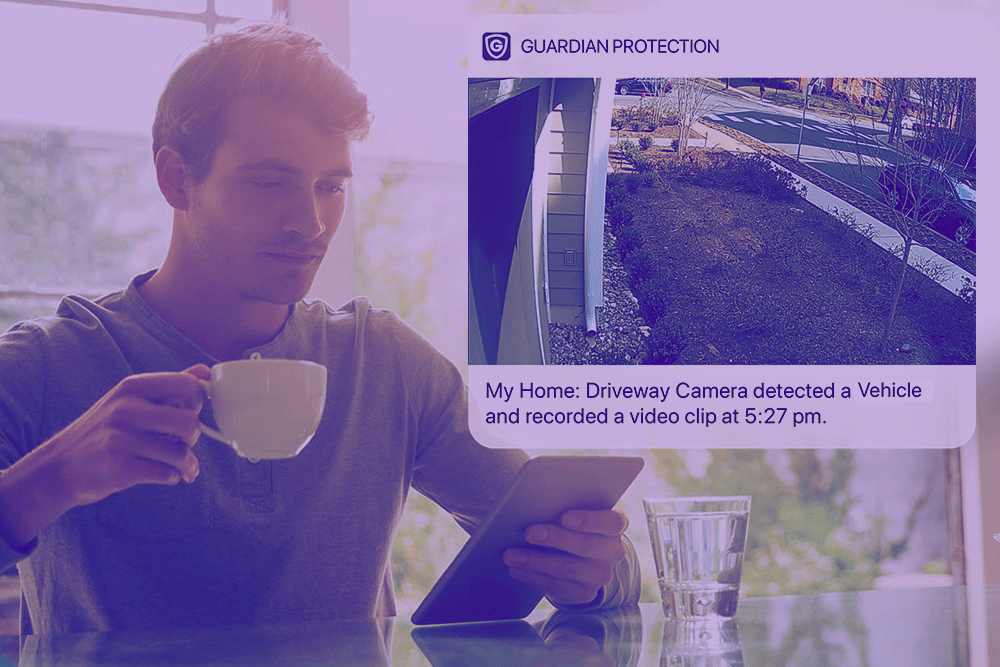
Smart video monitoring is a modern security essential, and one of the most powerful tools in your arsenal. Simply put, video cameras watch when you can’t. And when it comes to peace of mind, seeing is believing.
The big upside of smart cameras is the ability to view live video and access them anytime, anywhere. Mobile apps like the Guardian App allow you to view the footage your camera captures from your smartphone, download it, or just share it with a friend.
You have a lot of options when it comes to cameras, but here are the big ones you don’t want to skip.
Indoor and outdoor security cameras
Pretty straightforward, right? One is intended to record the exterior of your house, and one the interior. You’re guaranteed to benefit from indoor and outdoor cameras if:
- You travel for work or leisure
- You shop online and get packages delivered
- You have kids in school
- You have pets that stay home alone
In addition to getting mobile alerts and checking up on the kids or pets, some video cameras make it easy to see what actually happened in the event of an alarm. To get this benefit, choose a camera you can program to automatically record a video clip when a door opens or if your alarm goes off, like this one.
Video doorbell camera
Even if the name doesn’t ring a bell (sorry, couldn’t help it), you’ve probably seen a video doorbell before.
These come in a lot of shapes and sizes, and all of them are slightly different. But generally, a video doorbell is a doorbell with an integrated video camera, digital microphone, and speaker.
For the sake of getting into specifics, Guardian’s video doorbell lets you answer the door, speak to visitors via two-way audio, and record doorbell triggered clips right from the Guardian App. The uses are extensive – we’ll get into that more in another post – but for starters:
- Get a real-time alert when someone rings your doorbell
- See who’s at your door and “answer it” from wherever
- Know if someone’s lingering around your doorstep, and even catch them on video
- Get notified that a package was dropped off safely
- Pair with a smart lock and provide controlled access to visitors
Security cameras with smart video alerts
Not all security cameras are created equal. Choose a smart video camera that supports self-learning technology and smart alerts, like our Video Analytics feature.
Video Analytics uses artificial intelligence to help you get more of the alerts you want (your Uber’s in the driveway) and less of the ones you don’t (there’s a bluejay in the birdfeeder). By creating virtual zones and “tripwires” around your house you can enhance the security of your property and zero in the areas that need the most attention.
Smarter cameras can distinguish between people, vehicles, and animals, and notify you based on your preferences. You control what events should trigger an alert and what can be ignored, which equals more information and fewer false alerts. Nice, right?
Learn more about Video Analytics.
Monitored fire detectors
Burglar alarm monitoring is huge. But if you stop there, you’re missing out on a critical piece of home safety: monitored fire and carbon monoxide (CO) detection devices.
You may already have a smoke detector, but is it monitored? Keep in mind that once your smoke detector is triggered, you may not have long to get out safely. In less than 30 seconds, a small flame can turn into a major fire — and completely engulf a home five minutes later.
If you have monitored smoke detectors, the fire department will be notified of the alarm, even if you sleep through it.
Choose smoke detectors that include photoelectric smoke technology, which are especially useful for identifying abnormal levels of smoke. Even small, smoldering fires can generate a ton of smoke, and photoelectric smoke detectors help catch them before they get out of control.
For yet another layer of protection, heat detectors can be used in places that aren’t ideal for smoke detectors, like the kitchen. Heat detectors detect spikes in temperature, and when they’re monitored, a signal will be sent to your security company’s monitoring center.
Monitored Carbon Monoxide Detectors
So what about CO? Invisible and odorless, most people don’t think about it at all. While it’s incredibly deadly – at least 430 people die from accidental CO poisoning every year – initial symptoms of CO poisoning may seem pretty benign, like a flu. If it occurs while someone is sleeping, they may not notice any symptoms at all until it’s too late.
If harmful amounts of CO are detected, a monitored carbon monoxide detector will alert you and the monitoring center, who can request emergency assistance on your behalf.
Integrated smart home automation
Smart home automation elevates home security. Smart home devices use WiFi or Z-Wave technology to monitor and control various things throughout your house, like lights, cameras, locks, and more. The devices can be connected to each other and to your alarm system, and are accessible through one main point, like a smartphone or a computer.
The full run-down on all the home automation devices and features available to you could fill a Stephen King novel. Here’s a lightning round on the ones we think really move the needle when tied into your smart security system:

Smart lights
Connected smart lighting lets you control lighting throughout your home, while staying connected to your smart security system. Smart lights are endlessly customizable experience, and you can control them right from your smartphone or control panel.
You can set your lights to come on when motion is detected; set up schedules and tell them what to do at different times of the day; or make them part of a Scene that includes mutiple actions throughout your home.
Smart locks
Keyless smart locks let you lock or unlock your door remotely. You’ll know if you left the house without locking the door, and even who is coming or going throughout the day. You can even provide temporary codes for visitors for safe, keyless entry. Bye-bye, “hidden” keys.
Smart light control modules
They can give your home a lived-in look even when you’re not there. You can set lights to trigger on and off based on activity or time of day. Someone approaching your home while you’re on vacation? Let there be light.
Smart thermostat
You may not instantly associate this device with security, but it ties right in. In the event of a fire, our monitored smoke detectors can send a signal to your smart thermostat, telling it to shut the air off so it doesn’t redistribute smoke throughout your home.
Setting the perfect temperature for every part of your day and saving on energy costs is pretty sweet, too.
Bonus: Remember we mentioned the tie-in between motion detection and smart home automation? Guardian’s smart thermostat has built-in technology that can turn the thermostat off when no motion is detected.
Smart garage door control
Never wonder, “Did I forget to close the garage door?” These devices allow you to open or close your garage door remotely and can notify you if the door is left open.
Mobile app
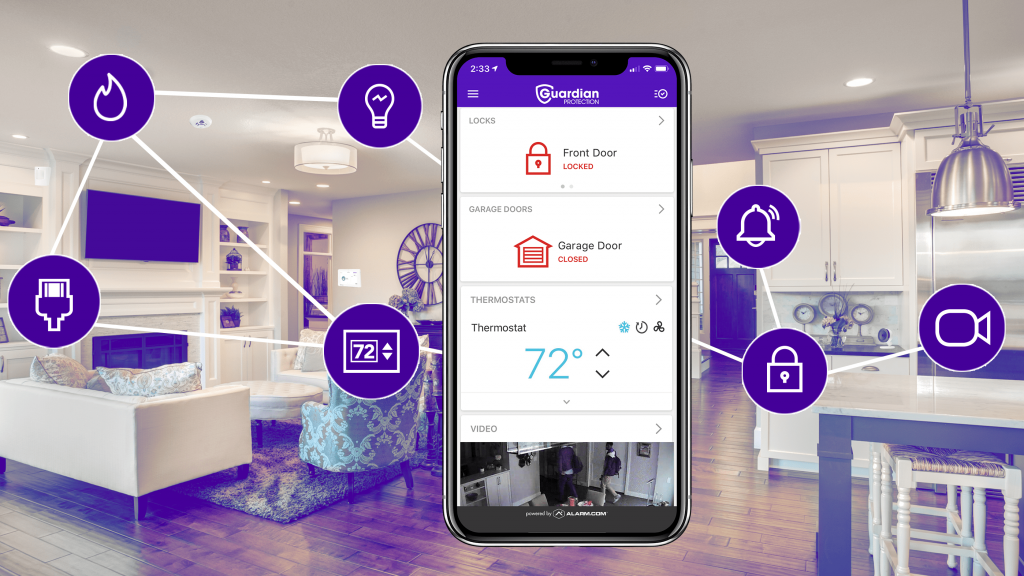
You want to be able to control your home from your devices. That’s a given. But just because smartphone screens get bigger doesn’t mean you have to clutter them with more apps. Do you really want:
- An app that arms/disarms your security alarm panel
- An app that opens and closes your garage
- An app that turns your lights on/off
- An app that adjusts your thermostat
And so on, and so on. Just thinking about navigating all that is enough to make you break out in hives. So why download 10 apps when one can do it all? Choose a smart home security company that offers a one-app solution for your home security and automation.
For home security, experience and dedication matters
For some companies, security is an afterthought — an add-on piece of their business they use to expand their services and break into new markets. With lives on the line, we think that sounds as risky as someone whose side-hustle is plastic surgery.
Only trust your home security to a company that is fully dedicated to keeping people safe. Better yet, trust one that has been doing it for a very long time. This will be a company that knows the nuances of not only the products you need and how/where to install them, but also the alarm process.
They should know the ins and outs of alarm response, including all the local teams that do the responding — EMS, police, firefighters, etc. Processes and protocols differ from region to region, so it’s vital the people working in a security company’s monitoring stations know how things work in your neighborhood.
Speaking of people, never underestimate the value of a human touch. Just like experience and dedication, personal service matters. No one wants to be alone when they’re afraid or feeling unsafe, and you deserve a security company powered by real people who care about you.
So there you have it — the ingredients of a smarter, safer home.
Keep in mind all homes and businesses are different, and the Goldilocks, just-right security solution for you may be different from your neighbor’s.
This is yet another point where Guardian can help. Our security experts will assess your needs and design the smart system to meet your needs.
Made the decision to protect your world? Ready to get started? Call 1.800.PROTECT (1.800.776.8328) today!
The post Your Ultimate Guide to Building the Best Home Security System appeared first on Guardian Protection Website.
source https://guardianprotection.com/blog/guide-to-home-security-systems/
Comments
Post a Comment